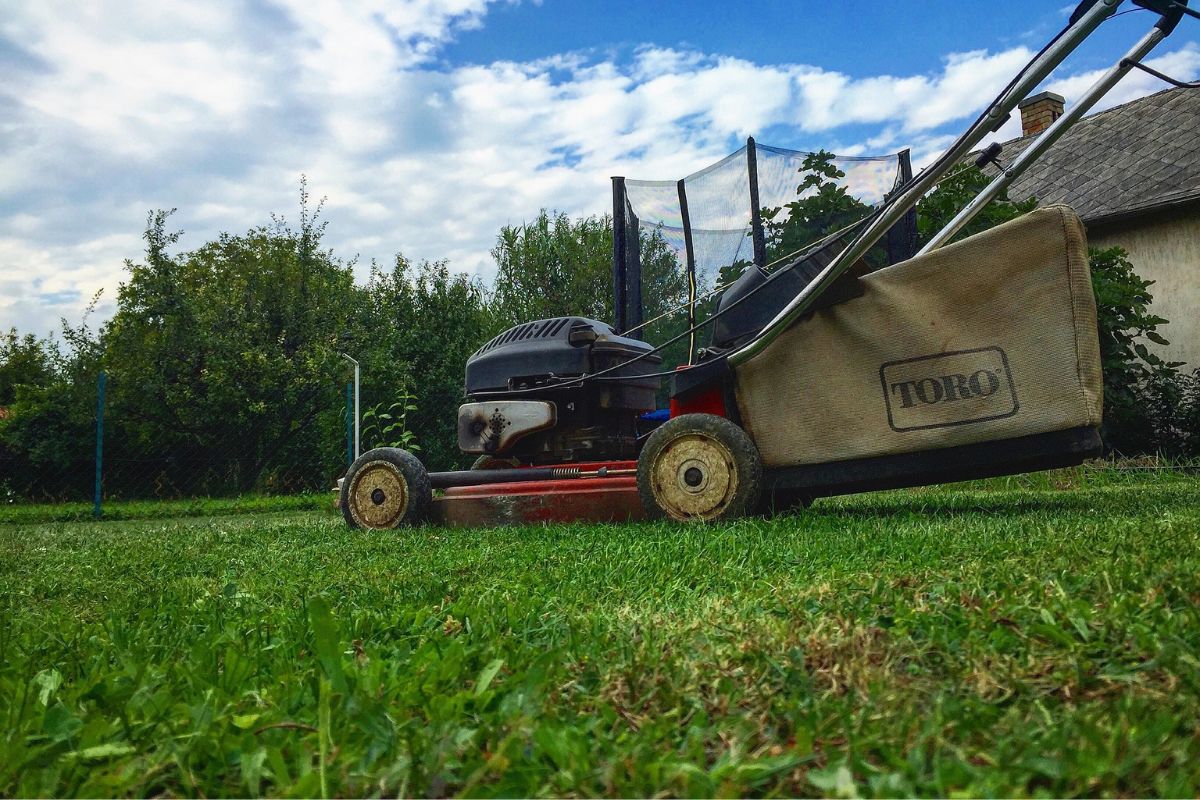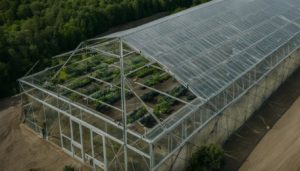Composting is an effective way of recycling organic materials. It has lots of environmental advantages.
But can you put lawn in compost?
Well, composting with grass clippings can be a great way to reduce waste and generate nutrient-rich fertilizer for your garden. But before you start throwing those mowed blades of grass into the mix, it’s important to understand how best to incorporate them into your compost heap.
I’ll cover all the basics here – from what types of grass are suitable for composting to the proper ratio of green material like grass clippings that should go into the bin. So read on and find out exactly how to make use of your lawn trimmings!
Benefits Of Composting
Composting comes with lots of benefits. Let’s mention a few.
- Adds valuable nutrients to the soil.
- Provides microbial diversity.
- Helps regulate moisture balance in your garden.
- Improves aeration techniques for better growth.
- Keeps pests away.
All these factors make composting very important for keeping our gardens healthy and flourishing.
Having identified the benefits of composting, which materials are suitable for composting? Read on!
Suitable Materials For Composting
Let’s talk about composting! Grass clippings, leaves, and fruit/vegetable scraps are all great materials for composting.
Grass clippings act as a great source of nitrogen, while leaves add carbon to the compost. Fruits and veggies provide a great source of nutrients, and their peels and scraps are easy to toss in the compost pile.
Here’s more on each material.
Grass Clippings
Grass clippings are a great choice for composting. Not only do they add all the necessary nutrients that plants need to flourish, but they also help keep weeds at bay.
Plus, you don’t even have to go buy it – since you already have it in your yard!
But make sure you mix in other materials like leaves, newspaper and coffee grounds into your compost pile so that there’s enough air circulation and oxygenation of the soil.
It’s important to use a good mixture when making compost so that all the plant selection, soil nutrition and weed suppression needs are met.
With this combo, you’ll be well on your way to having lush lawns in no time!
Leaves
Leaves are another great choice for composting.
Not only does composting with leaves provide soil amendments like nitrogen and phosphorus, but they also help attract beneficial fungi that can help improve the quality of your garden’s soil.
You don’t have to go out and buy leaves either – a lot of people rake them up in their yards! Plus, you can mix them with other materials like kitchen scraps or coffee grounds for an even better compost pile.
So get those gloves on and start collecting some leaves – it’ll be well worth it when you have healthy plants thanks to this mighty combination of materials.
Fruit/Vegetable Scraps
When it comes to composting, you don’t have to limit yourself to leaves! Fruit and vegetable scraps are also great additions for getting your home composting up and running.
Adding in a few composting worms can help break down the material faster – creating nutrient-rich compost teas that will make your garden thrive.
You’ll be amazed at how much of an impact these ingredients can have on soil health!
TIP: Just remember not to add any meat or dairy products as they’ll attract unwanted pests.
So get creative with those leftovers and start turning them into something useful today.
Steps To Create Compost
Creating compost is much like piecing together a jigsaw puzzle. It takes some hard work, the right ingredients and a little bit of know-how to make it happen.
To create your own worm composting system, begin by gathering vegetable scraps, wood chips and plenty of other brown materials – think dried leaves or cardboard.
You’ll also need moisture levels that are just right; not too soggy but not too dry either.
Temperature requirements also need to be met when composting – if the pile isn’t heated up enough, necessary microbes may not form.
Once you have all these elements in place, add your lawn clippings and let nature do its job!
Factors To Consider Before Adding Lawn Clippings
Before adding lawn clippings to your compost pile, it’s important to consider a few factors.
Type Of Soil
The type of soil can have an effect on the success of your composting efforts and should be taken into consideration.
Soil aeration techniques and nutrition depend on the kind of grass you have, which might mean your compost could get an unwanted nutrient boost or fail to provide enough for healthy plants.
To make sure it’s done right, consider using specific composting techniques that are tailored to a particular soil type.
Type Of Grass
When it comes to adding lawn clippings, the type of grass you have is important. Different types of grasses require different weed control methods and nutrient levels in order for them to thrive.
Plus, if your soil has a lot of pests or weeds, they can be spread through mowing and composting too! That’s why it’s vital that you choose the right kind of grass – one that will work well with your climate, soil nutrition needs and pest management strategies.
Doing this will help ensure that your lawn stays healthy and lush all year round!
Composting Techniques
Your composting method also makes a difference.
Decide whether you’re going to use a traditional composting method, a tumbler, or a passive pile system. This can help you determine the volume of clippings you should be adding to the pile.
Temperatures/Season
The time of year and temperature should also be considered.
Composting works best in warm temperatures and during the summer months.
But it’s important to also make sure the compost pile doesn’t get too hot, as this can kill beneficial bacteria.
Tips For Successful Composting
Nutrient Balance
When it comes to the nutrient content, it’s important to make sure there is a balance of materials.
This can be achieved by adding a variety of items, such as leaves, vegetable scraps, and fruit peels, in addition to the lawn clippings.
While at it, monitor the material sources and make sure that only organic materials are going into the compost pile.
Pest And Weed Control
If you’re composting in an area where pests or weeds are a problem, it’s important to take steps to prevent them from entering the compost pile.
Aeration
Aeration is key to successful composting. That’s why you should regularly turn the compost pile – to keep oxygen levels high and prevent odors from forming.
Aim for mixing up the contents at least once a week.
You could invest in a compost tumbler which will help aerate the mixture more efficiently than manually turning it over with a shovel or pitchfork.
Moisture Levels
In addition, the moisture content of the compost pile should be monitored to make sure it is not too wet or too dry.
Temperature
Temperature requirements also need to be met when composting – if the pile isn’t heated up enough, necessary microbes may not form.
Odor Control
It’s important to keep odor control in mind. Make sure to add materials to the compost pile that will help to keep it from smelling.
Keep Animals Away
Use animal deterrents to make sure that animals are not attracted to the compost pile.
TIP: Adding lawn clippings or other green nitrogen-rich materials like kitchen scraps will help provide nutrients while also keeping smells at bay. Just make sure not to add too much as this could throw off the balance in your compost pile.
Doing these simple steps will help create an ideal environment for breaking down organic matter into rich soil amendment which can then be used in gardens or landscaping projects.
Conclusion
In conclusion, composting is a great way to provide your garden with essential nutrients. With a little bit of effort and some patience, you can turn your lawn clippings into a valuable fertilizer for your plants.
Composting doesn’t have to be hard or complicated; it’s as easy as turning the pile every once in awhile and adding more materials when needed. The end result will be healthy soil full of organic material that will give your plants the nourishment they need to thrive.
So don’t let all those grass clippings go to waste – put ’em in the compost! You’ll be glad you did!
Frequently Asked Questions
How Long Does It Take For Compost To Be Ready To Use?
Composting is a process that requires mixing ingredients, controlling pests, balancing pH levels, and regulating air circulation and moisture content.
When done properly, it can take anywhere from 4-6 months for compost to be ready to use in your garden or yard.
What Are The Benefits Of Using Compost In The Garden?
Composting comes with many benefits, such as:
- Avoiding pests.
- Providing nutrient needs for plants.
- Aiding in soil aeration.
- Providing microbial diversity
- Regulating moisture balance in your garden
Is It Necessary To Turn The Compost Pile?
Turning a compost pile is like turning over a new leaf – it’s absolutely necessary in order to keep the soil aerated, mix all the ingredients together and avoid any pests.
It also helps add essential nutrients to your garden while retaining moisture for healthier plants.
The process of flipping your compost can be done with tools like pitchforks or shovels, but once you get into the habit of doing it regularly, you’ll reap the rewards from having healthy soil!
How Often Should I Add Lawn Clippings To The Compost Pile?
Adding lawn clippings to your compost pile is an easy and effective way of pre-composting!
To ensure that everything breaks down properly, make sure to add lawn clippings every two weeks.
Depending on the type of grass, you’ll need to rotate between adding thin layers of grass and aerating the soil. This will help keep pests away while also encouraging green mulching in your garden or yard.
Is It Safe To Use Compost On Edible Plants?
Believe it or not, composting can actually be beneficial for your edible garden!
Not only does it aerate the soil, ensuring adequate water and air flow to plant roots, but compost also helps control pests and weeds while balancing out nutrient levels in the soil.
It’s a win-win situation; you get delicious fruits and veggies from your garden without having to use synthetic pesticides and fertilizers that may harm both people and wildlife.
Who’d have thought something as simple as compost could do so much?
Photo by Zozz.


